#bakana
Text
the indignation experience in tales of arise is not one of “holy shit they put indignation in tales????” as much as one of
Indignation?
At this point of the game?
In this part of the battle?
This early in the playthrough?
Localized entirely within the second boss’ chamber?
#may I sonna bakana?#indignation is supposed to be a late-game spell!#(unless you are the Chad Morrison)#honestly having it show up this early sends a message to the player#'this game does not pull any punches you are never safe expect the unexpected'#NEIL DRUCKMANN how does he keep doing it#'if the Second baddie out of 5-6 casts indignation then whats next?'#'what manner of humiliation will i be subjected to next? *sweating a little hornily*' was my line of thinking#it really set high expectations for the remainder of the game!!#expectations the game did not deliver on!!!#it just didnt :D#wouldnt it be hilarious tho if ganabelt legit cast indignation as soon as the battle starts#à la Sans you know#like yes on the one hand he does have sense of theatrics#so maybe he wouldnt wanna play that trump card right away#but also Alphen and co are pesky cockroaches and he's toyed with em enough as it is#why not just smash em right then and there like congrats you've made it to the Spirit Vessel's chamber also KABOOM
2 notes
·
View notes
Text
boys boys boys boys ♂️♂️♂️♂️♂️♂️♂️♂️♂️♂️♂️♂️♂️♂️ gods creation the male species i can feel myself getting sweaty and shaking head spinning
3 notes
·
View notes
Text

new jester joins the fray (i think i have... like over 10 jesters now...)
this is sasori, the jester who streams and is also a very popular streamer by very legitimate and i mean legitimate means :)
i hope i'll be able to draw more of them!
1 note
·
View note
Text
İyi geceler
Bu gece tanımamış olmak istedim seni bu ilk değildi maalesef nefret ettim bana seni hatırlatan her şeyden sözlerinde seni bulduğum şarkılardan sensizlikten ağladığım gecelerden yaralardan asla iyileşmicek yaralardan acıyan kalbimden asla baskın çıkmayan aklımdan öyle bırakıp gitmeme izin vermeyen her şeyden dolayısıyla en çok kendimden nefret ettim senin yüzünden kendimi derin bi çukurda hissediyorum ne zaman emin adımlarla tırmansam ışığa doğru ne zaman ellerimi paramparça ederek tırmanmaya yeltensem olmuyo yapamıyorum Önümü kesiyorsun ne zaman ayağa kalksam sırtıma geçiyorsun ve ben yine tepe taklak en korkunç rüyalarımda sen çıkıyorsun kapı arkalarından ben hala sana sığınıyorum rüyalarımda yokluğun rüyalarıma bile acı veriyo duy istiyorum taktir et acimi utan kendinden bana bunları yaşattığın için bakana kimsenin yüzüne ben onu artık sevmek istemiyorum özlemek istemiyorum diye ağladığım her gece için her çağresizlik anı için ayrı ayrı pişmanlık duy istiyorum arkada Cem Karaca "sen de başını alıp gitme nolur" diyo ben de artık başımı alıp gidebilmek unutabilmek istiyorum

66 notes
·
View notes
Text
"Üç kız çocuğu yetiştirmeye cennetin vadedilmesi, iman eden herkesin ciddi bir şekilde düşünmesi gereken bir tutumdur. Aynı şey erkek çocuk için vadedilmemiştir. Daha sonra bu kız çocuklarının sayısının ikiye indirilmesi, ikinin de bire çekilmesi ise çok daha derin bir düşünceye davetiye çıkarmaktadır. Kız kardeşlerine bakmak durumunda olan bir Müslüman'a vadedilenle kendi kızlarına bakana vadedilen müjdenin aynı olması ise gözümüzü nelere açmamız gerektiği konusunda önemli bir ipucudur.
Kız çocuğu ve cennetin bir cümlede birleşmiş olması, nihai gayesi Allah Teâlâ'nın rızası ve cennet olan bir mü'min için heyecan verici olmalıdır. Üç hatta iki kız çocuğunun, bazen de bir kız çocuğunun bedelinin cennet olması, hayata bakış tarzını değiştirecek kadar
büyük bir ufuk açmaktadır önümüze."
23 notes
·
View notes
Text
Aynaya bakana kadar bir prens olduğuna inanmadım.
21 notes
·
View notes
Text
Sasuke's monologue ch. 698
Fasten Your Seatbelts. I'm warning you, this is one hell of a emotional ride.
Y'all know that Japanese people prefer to express things indirectly. They're tend to be more comfortable with indirect communication. To avoid embarrassment and conflict, they prefer to use more roundabout ways of expressing opinions. You don't have to admit things directly because that's impolite. Even if Japanese people want to say "no" in their mind, they are often afraid that the person they are talking with might feel bad if they say so. So, usually they may pretend to go along with what someone said to them. Japanese people in particular show interest in a person or topic they are not really interested in, in order to protect their conversational partner's feelings. This might be annoying to some foreigners, but that’s the culture. So for example:
1. Wanna go out to for a drink??
a) Thanks, I'm good. b) Erm... Okay
These are two ways to politely reject without a flat-out NO. If you are unclear about whether it is a "yes" or "no, pay attention to their nonverbal expressions, pay attention to what they are saying, their subtle body language, their hesitation and also changing the subject are really means 'No'. Manners, etiquete, and mutual respect play an important role in Japanese society. Don't forget this polite mind is avoided in certain circumstances. For example, if you find yourself approached by a suspicious person on the train or bus or on the street, or if you find yourself in an unpleasant situation in general, put yourself first and don't worry about someone else's feelings.
Okay. So, most people will get offended if you are too direct. You should be more careful while being generally open to your thoughts, feelings, and opinions. And here Sasuke was like, 'I'm going with all of these.' His speech was so so so direct that even Japanese people would not dare to say so.
{ I added some additional notes in the 'Meaning section'. Hope this is helpful!!}

Panel - 1
Raw: ・・・ナルト・・・ お前が昔... 常に一人でいるのは知っていた
Romaji: Naruto.... Omae ga mukashi ... tsuneni... Hitori de iru no wa.... shitteita
Literal: Naruto.... I knew... in the past... You were always alone...
Raw: 生き残ったうちはのオレと同じで里で皆に疎外されていたな...
Romaji: ikinokotta uchiha no ore to onajide sato de mina ni... sogai sareteitana …
Literal: survived.... me from the uchiha... and you just like me, by everyone in the village.... we were alienated.
Panel-2
Raw: バカなことをしては わざと叱られようと していた ・・・
Romaji: bakana koto o shite wa wazato shikarareyō to shiteita …
Literal: Doing idiotic/foolish things on purpose for trying to be get scolded...
Raw: 他人と関わる 為だろう・・・
Romaji: tanin to kakawaru tamedarō ・・・
Literal: just for interacting with others...
Raw: 最初はそんな お前を見て くだらない奴だと 思った
Romaji: saisho wa sonna omae o mite kudaranai yatsuda to omotta
Literal: In the beginning, when I watching you like that, I thought you were a stupid/worthless guy
Raw: じゃれたいだけの 弱い奴だと
Romaji: jaretai dake no yowai yatsuda to
Literal: The type of weak guy who only just wants to be playful.
[[ When we keep an eye on someone or something, we watch it carefully and pay attention to it. And observes the person's behavior. That's what Sasuke was doing here. At that time, even when he was still a small kid, Sasuke properly "analyzed" why he was interested/curious in Naruto...]]
Meanings
• 昔 (mukashi) - old times, old days, former, in the past.
• 常に (tsuneni) - Constantly, always, all the time, all of the time.
• 一人でいる (hitori de) - alone, oneself, lonely
• 知っていた (shiteita) is used when you "already" knew something.
• 生き残った (ikinokotta) - to survive
• 同じで (onajide) - same, just like
• 疎外(sogai)- estrangement; neglect; alienation; casting out
• 叱られる (shikarareru) - to be scolded
• わざと(wazato) - on purpose; intentionally; deliberately
• 関わる(kakawaru) it means as interacting with people
• くだらない (kudaranai) - good-for-nothing; stupid; trivial; worthless
• 最初 (saisho) - beginning; first
• 見て(mite) - to see; to look; to watch; to view; to observe; to keep an eye on
• じゃれたい (jaretai) - to be playful; to mess around; to gambol; to be amused (with something); to play
• だけ (dake) - only; just; alone; merely; that’s all
• が (ga) prt. - Ga marks the subject of a sentence when the information expressed by
the subject is first introduced in a discourse. Wa replaces ga when the subject is a topic or a contrasted element.
Ga conj. - But. It makes a sentence unit with the preceding sentence, not with the
following sentence. Thus, it is wrong to place a comma before ga or to
start a sentence with ga. Daga, dakedo, demo, shikashi and keredomo express the same idea as ga.

Panel-1
Raw: ・・・だが 何度も バカをして 叱られている お前をずっと見ていると
Romaji: ...daga, nando mo baka o shite shikarareteiru... omae o... zutto miteiruto...
Literal: But, over and over again, you would get scolded for doing stupid things... I was keep watching you this whole time...
Raw: ・・・なぜだか 気になるように なった
Romaji: ... nazedaka ki ni naru yō ni natta
Literal: For some reason/without knowing why, somehow.... I became as anxious and worried (about you).
Panel-2
Raw: その時思った ・・・
Romaji: sono toki omotta...
Literal: At that time I thought....
Raw: お前の弱さがだんだんオレに 染まってきたんだと
Romaji: omae no yowasa ga dandan ore ni somatte kitanda to
Literal: your weakness gradually came to taint me.
Panel-3
Raw: それからのお前を見る度にど んどん気になるようになっていった
Romaji: sore kara no omae o miru tabi ni dondon ki ni naru yō ni natteitta
Literal: And then, steadily, every time I saw you, I (my heart/mind) became uneasy....
(It means that Sasuke become uneasy when Naruto were on his mind)
Raw: 他人と繋がろうと必死なお前を見ていると
Romaji: tanin to tsunagarō to hisshina omae o miteiruto
Literal: I was watching you desperately trying to be connected to other people...
Raw: オレの家族を思い出すようになった
Romaji: ore no kazoku o omoidasu yō ni natta
Literal: (Because of that) I began to remember my family.
(Bcuz of Naruto's actions, it made him remember his family)
Meanings
• 気になる(kininaru) - to be on one's mind, to worry one, to care about, to be bothered by, to feel uneasy, to be anxious
[[ 気になる (kininaru) means something/someone - interests you/ makes you think about it/them/ catches your attention / makes you feel curious, Something/Someone - bothers you / makes you curious/ interests you, Someone/something - you worry about / you be concerned about. "kininaru" is a verb meaning "care", "recognize", and sometimes "like". So, Kininaru is often used for romantic interests. Here, Sasuke repeats that he gets worried/anxious/uneasy whenever he sees or thinks about Naruto. It affecting him very strongly and powerfully. So, when Sasuke says this it means whenever he sees Naruto, his heart suddenly feels heavy and it hurts him emotionally. ]]
• As you can see, Sasuke tried very hard to be acknowledged by his parents... here Naruto was trying his best to get attention from others to show his 'existence'. So he knows how painful it is. And moreover he was watching him. So, seeing Naruto hurt, it terribly hurts Sasuke too.
• なぜだか (nazedaka) - somehow; for some reason; without knowing why
• ずっと (zutto) - continuously in some state (for a long time, distance); throughout; all along; the whole time; all the way; much (better, etc.); by far; far and away; far away; long ago; direct; straight
• だんだん (dondon) - gradually
• 弱さ (yowasa) - weakness
• 染まる(somaru) - to be tainted; to be infected
• 気に (tabini) - each time; everytime; whenever (something happens); on the occasion of
• 繋がろう (tsunagarō) - to be tied together; to be connected to; to be linked to; to lead to; to be related to; to be related (by blood)
• 必死な (hisshina) - frantic; desperate; inevitable death
• 家族 (kazoku) - family; members of a family
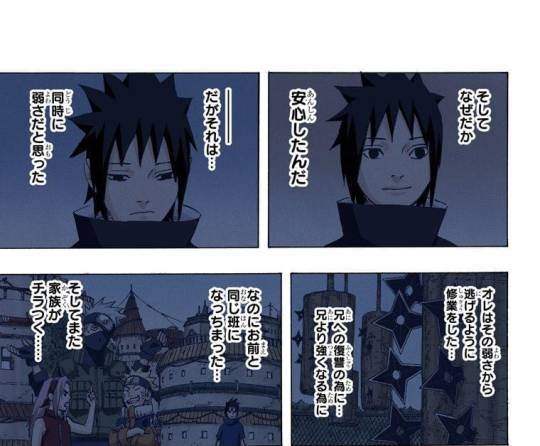
Panel-1
Raw: そしてなぜだか安心したんだ
Romaji: soshite nazeda ka anshin shita nda
Literal: And then... without knowing why, somehow.... I felt relieved.
Panel-2
Raw: だがそれは ... 同時に弱さだと思った
Romaji: daga sore wa... dōjini yowa sada to omotta
Literal: But... at the same time... I thought It was a weakness.
Panel-3
Raw: オレはその弱さから 逃げるように修業をした…
Romaji: ore wa sono yowa sa kara nigeru yō ni... shūgyō o shita …
Literal: So that, In order to escape from that weakness... I trained...
Raw: 兄への復讐の為に ... 兄より強くなる為に
Romaji: ani e no fukushū no tame ni... ani yori tsuyoku naru tame ni
Literal: for the sake to get revenge on my brother... for the sake of becoming stronger than my older brother
Panel-4
Raw: なのにお前と 同じ班に なっちまった…
Romaji: nanoni omae to onaji han ni natchimatta
Literal: And yet... I ended up in the same team as you...
Raw: そしてまた 家族が チラつく...
Romaji: soshite mata kazoku ga chiratsuku ...
Literal: And then... again, my family flickered (through my mind)
[ It is noted that since ellipsis is common in Japanese, Japanese sentences are often ambiguous in isolation. "Flickering" in this sentence means ''Flicker into someone's mind".]
Meanings
• When Sasuke uses 弱さ (yowasa) it shows his degree of weakness / how weak he is. He directly admits that Naruto is becoming his physical/mental/emotional weakness.
• Naruto, who reminds of his “family" and also becomes his "weakness" that is something that Sasuke wants to escape from.... so, he trained hard to escape from that 'weakness'. When Sasuke said "I ended up in the same team as him", it means that Sasuke was "extremely conscious" of Naruto... He ran away and tried to escape from his 'weakness', but as he tried to escape, fate brought him back to where he tried to escape his 'weakness'. It's okay to mention his family once , but he constantly repeating that Naruto reminds him of his family... I think that means that Sasuke was starting to see Naruto as family.
• そして (soshite) - and; and then. (It is a coordinate conjunction that connects two sentences.)
• なぜだか (nazedaka)- somehow; for some reason; I don't know why; without knowing why
• 安心した (anshinshita) - relieved
[[ 安心 as "relief" or "peace of mind". 安心 has the kanji for safe and heart. It means peace of mind your heart is at ease.]]
• 復讐 (Fukushū) - revenge
• の為に (no tame ni) - for the sake of
• 逃げる (nigeru) - to escape; to run away
• 修業 (shūgyō) - pursuit of knowledge, studying,learning, training, completing a course
• なのに (nanomi) - and yet; despite this; but even so; but even then; however; nevertheless; for all that; notwithstanding that
• 班 (han) - group; party; team; squad; section
• また (mata)- again; and; also; still (doing something)
• チラつく (chiratsuku) - to flicker; to flit; to litter; to be dazzled
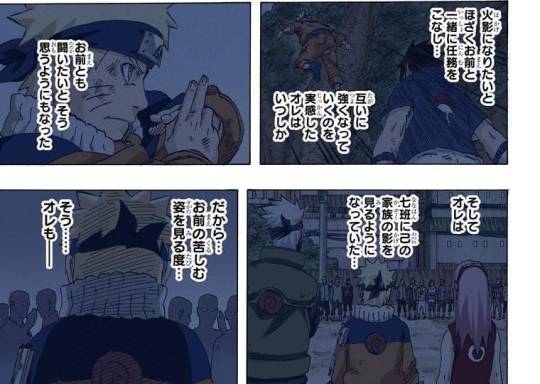
Panel-1
Raw: 火影になりたいとほざくお前と一緒に任務をこなし...
Romaji: hokage ni naritai to hozaku omae to issho ni ninmu o konashi ...
Literal: (you) babbling on wanting to become hokage... and (I) went on missions together (with you) ...
Raw: 互いに 強くなって いくのを 実感した オレは いつしか
Romaji: tagaini tsuyoku natteiku no o jikkan shita, ore wa itsushika...
Literal: Before I knew it, I truly felt that (we) were both mutually going towards getting stronger ....
Panel-2
Raw: お前とも闘いたいとそう 思うようにもなった
Romaji: omae to mo tatakaitai to sō omou yō ni mo natta
Literal: (I) really thought that I want to fight you too.
[[ Here, Sasuke using 思う (omou) - It means 'to think'. When you 'think', it comes from your heart (inner thoughts), rather than your head. 思う is used for "thinking from the heart," it is a better fit for reactions. It shows the current feeling. The subtlety of "thinking" is that you are "emotionally paying attention" to the object. ]]
Panel-3
Raw: そして オレは七班に己の家族の影を見るようになっていた ...
Romaji: soshite ore wa nana han ni onore no kazoku no kage o miru yō ni natteita ...
Literal: And then I.... in team7, began to see the silhouette of my own family.
Panel-4
Raw: だから... お前の苦しむ姿を見る度...そう... オレも---
Romaji: dakara... omae no kurushimu sugata o miru tabi ... sō... ore mo...
Literal: That's why... Every time I saw you appearing to be suffering... that's right.. I, too...

Raw: オレが痛くなったんだ
Romaji: ore ga itaku natta nda
Literal: I became pained.
[[ Sasuke using 痛く which means he's in such intense pain, that words couldn't explain how much it was. The magnitude of the 'extreme pain' greatly affects both his body and mind. The choice of kanji (痛く) Kishimoto given to Naruto & Sasuke when they express their feelings, it screams how much terribly they hurt, but it's not just 'pain'. I've already talked here about Kishimoto expressing other characters' pain with 「痛い」 The word 痛い (itai) can be used in many situations. It means 'ouch' or 'hurt'. You can point out to any body part to say something is in 'pain' eg: 足が痛い (ashi ga itai) - my leg hurts. You can use 痛い when recovering from a bitter past, experiencing something unpleasant in the past, or feeling pain. Here, Sasuke uses オレ = 痛く, and what I'm saying is that Japanese people don't say it that way. What he said literally meant 'I'm hurt'. But you have to say your (body part ) is hurt. Neither of them saying which part of their body was hurting, but their pain was excruciating. It is worth noting how Kishimoto expresses their feelings and pain in spoken language.]]
Meanings
• いつしか (itsushika) - before one knows; unnoticed; unawares
• 実感した - real feeling; actual feeling; to actually feel; to have a real feeling (that ...); to experience personally
• 互いに - mutually; with each other; reciprocally; together
• いく ( iku) - to go (towards)
• 闘い (tatakai) - battle; fight; struggle; conflict
• そう (sou) - so; really; seeming; appearing that; seeming that; looking like; having the appearance of
• 強く(tsuyoku) - strongly, powerfully, hard
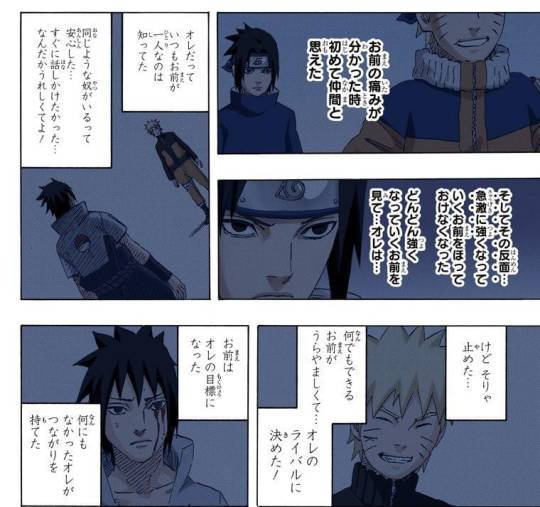
Panel-1
Raw: お前の痛みが分かった時初めて仲間と思えた
Romaji: omae no itami ga wakatta toki hajimete nakama to omoeta
Literal: When I understood your pain, that was when I began to think of you as a friend
Panel-2
Raw: そしてその反面急激に強くなっていくお前をほっておけなくなったどんどん強くなっていくお前を見て... オレは ...
Romaji: soshite sono hanmen... kyūgeki ni tsuyoku natteiku omae o hotte okenaku natta... dondon tsuyoku natteiku omae o mite... ore wa...
Literal: But then, on the other hand, you suddenly become stronger... I became (unable) to ignore it.. I watched you steadily get stronger... I ....
[[Naruto suddenly becomes stronger and stronger in front of his eyes, so that he can't ignore the progress that is happening in Naruto in order to reach him.]]
Panel-3
[Flashback- Naruto🍥]
Raw: オレだっていつもお前が一人なのは 知ってた
Romaji: ore datte itsumo omae ga hitori nano wa shitteta
Literal: I always knew you were... alone.
Raw: 同じような奴がいるって安心した・・・
Romaji: onaji yōna yatsu ga iru tte anshinshita ・・・
Literal: There was someone similar to me.... I was relieved...
Raw: すぐに話しかけたかった・・・なんだかうれしくてよ!
Romaji: sugu ni hanashikaketakatta ・・・ nandaka ureshikuteyo !
Literal: I immediately wanted to talk to you... Somehow/somewhat (I felt) happy!!
(Here when Naruto says なんだか (nandaka), it conveys a sense of vagueness, a sense of not knowing quite why or how the current situation came about. Naruto felt happy, for some reason but he didn't know why he felt that.)
Panel-4
Raw: けどそりゃ止めた... 何でもできるお前がうらやましくて… オレのライバルに決めた!
Romaji: kedo sorya tometa... nandemo dekiru omae ga urayamashikute… ore no raibaru ni kimeta !
Literal: However, I stopped (myself).... You can do anything... I was jealous (of you). I decided you would be my rival !
Panel-5
Raw: お前はオレの目標になった
Romaji: omae wa ore no mokuhyō ni natta
Literal: You became my "goal".
Raw: 何にもなかったオレがつながりを 持てた
Romaji: nani ni mo nakatta ore ga tsunagari o moteta
Literal: I, who had nothing... had a "bond".
Meanings
• 反面 (hanmen) - while, although; on the other hand
• 急激 (kyuugeki) - sudden; precipitous; radical
• 強く(tsuyoku) - strongly, powerfully, hard
• 時 (toki) literally means 'time'. It is usually used after dependent clauses in the sense of "when" and not as a question of "when."
• 初めて (hajimete) means 'for the first time'
• ほって おけ (hotteoke) - to leave alone; to leave as is; to ignore; to neglect
• ように (youni) takes on various meanings in different expressions, including seems, similar to, just like, for the purpose of, so as. In its basic form ように means 'looks like' or 'similar to'. When ような is found at the end of a sentence, it takes on the meaning of a wish, hope, or prayer for something to happen.
• 安心した (anshinshita) - relieved
In the flashback (ch.485), Sasuke remembers what Naruto said in that glittering space (Idk what to call it), and Naruto uses the word 'Anshinshita' when revealing his feelings. Naruto says the exact same thing Sasuke says he felt when he saw Naruto. 安心 as "relief" or "peace of mind". 安心 has the kanji for 'safe' and 'heart'. So it means "peace of mind your heart is at ease".

In Vote 1 Naruto had used the word 『 安心したんだ 』 ' anshinshitanda' in his monologue and now he was talking about 'it' face to face with Sasuke.
In case you're wondering, Naruto's monologue and in Sasuke's monologue both use 'Anshinshita + Nda'. んだ (nda) is used at the end of sentences. んだ is a casual and preferred in speaking. んだ- One way in which it often does this is by emphasizing the feelings of the speaker.
• すぐに (sugu ni) - immediately; right away; instantly
• うれしくて (ureshikute) - happy; glad; pleased; delighted; overjoyed
• 話 can be used as any of the following English words: talk; speech; chat; conversation. They are basically all referring to the same thing.
• けど (kedo) - used to show the contrast: but; however; although; even though
• 何でもできる(nandemo dekiru) - (someone) can do anything.
• 決めた (kimeta) - to decide; to choose; to determine; to make up one's mind
• 目標" which means "goal", "target", "aim", "mark"
• 何にも (nannimo) - nothing
• つながり- Bond
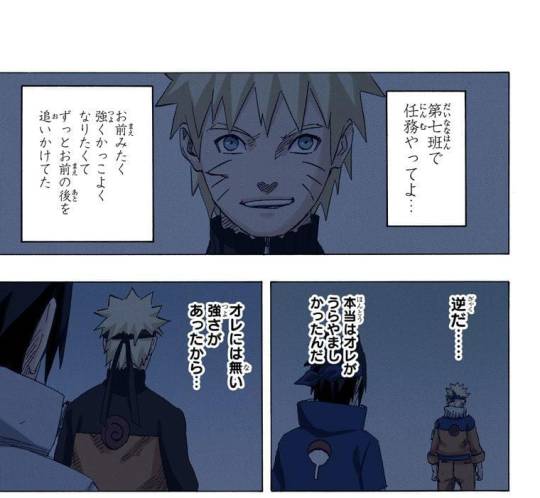
Panel-1
Raw: 第七班で任務やってよ・・・ お前みたく強くかっこよくなりたくてずっとお前の後を追いかけてた
Romaji: dai nana han de ninmu yatteyo... omae mitaku tsuyoku kakkoyoku naritakute zutto omae no ato o oikaketeta
Literal: Doing missions... With team 7.... I watched you becoming stronger and cooler. All along, I was chasing after you/following you (to be like you).
_END OF FLASHBACK 🍥_
Panel-2
Raw: 逆だ... 本当はオレがうらやましかったんだ
Romaji: gyakuda ... hontōwa ore ga urayamashikatta nda
Literal: It was the opposite... (The fact is that) I was the one who was jealous (of you).
Panel-3
Raw: オレには無い強さがあったから…
Romaji: ore ni wa nai tsuyo sa ga attakara...
Literal: Because you had a strength that I didn't have...
Meanings
• 逆 (gyaku) means "reverse" or "opposite
•本当は (hontōwa) means actually. And it means that the person who says 本当は has some other things in mind that they really want to do. But instead of revealing their true feelings/desires, they have lied and said something different, but they regret it and are now trying to be authentic about themselves and about their true feelings. That's why Sasuke says he was jealous of Naruto.
• 羨ましい (うらやましい) urayamashii : an i-adjective meaning ‘jealous’. urayamashikatta – 羨ましかった (うらやましかった) : the 'ta' form of “urayamashii”, meaning ‘was jealous’ or ‘were jealous’.
• かっこよく(kakkoyoku) - attractive; good-looking; stylish; cool; handsome
[[ かっこう (Kakkou) : a noun meaning ‘appearance’. いい (ii) : an i-adjective meaning ‘good'. The both components joins and literally means ‘appearance good’. Naruto Using かっこよく (kakkoyoku). よく ( = yoku) is an adverb form of いい ( = ii). If you notice in the expression “kakko ii” the “u” is dropped. The “u” has also been dropped at the the end of “kakkou.” You can also write it only in hiragana, as かっこいい (kakkoii), or in full katakana, as カッコイイ (kakkoii). However, when it is spoken, it is usually pronounced as かっこいい (no "う").. That's why it's usually written as "かっこいい" and "カッコイイ" (without う・ウ, respectively) in hiragana and katakana. Kakkoii has two main meanings: 1. “Cool” (something physically present meets your enthusiastic approval), and 2. “Hot” (a man whose appearance is overwhelmingly pleasing to you). Kakkoii is also used as an interjection when seeing something cool or finding a man attractive. kakkoii is only used for people and things physically present. (Kakkoii) is used to describe the Physical Appearance of something and not a Situation. It isn’t as flexible in usage as “cool” is in English. The final い (i) sound in kakkoii is often lengthened depending on the speaker's enthusiasm. If you are speaking with more formal language you should use “kakko ii” instead of “kakkou ii". You can use this (kakkoyoku) expression in the adverbial form.
In ch. 285 When Sakura compared Sasuke to Sai, Naruto used 方がカッコイイ (hō ga kakkoī) means 'Sasuke's way more cooler'. It was good to see what Naruto thought of him fully presented in front of Sasuke. ]
• 強く (tsuyoku) - strongly, powerfully, hard
• 追いかけて (oikakete) is a conjunction of the verb 追いかける means to chase someone or follow after someone/something
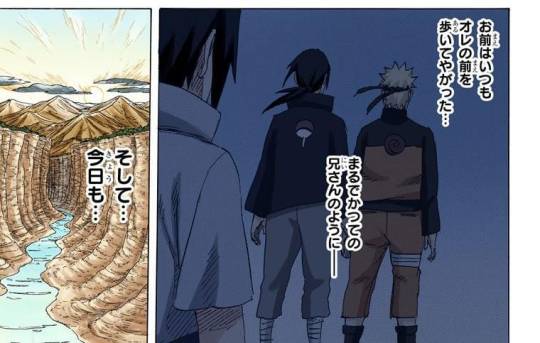
Panel-1
Raw: お前はいつもオレの前を歩いてやがった...
Romaji: omae wa itsumo... ore no mae o... aruite yagatta ...
Literal: You were always... walking in front of me...
Raw: まるでかつての兄さんのように----
Romaji: marude katsute no nīsan no yō ni ----
Literal: Just like my former older brother....
Panel-2
Raw: そして... 今日も...
Romaji: soshite... kyō mo ...
Literal: And then... today (also) ...
Meanings
• いつも (itsumo) - always; usually; every time; never
• 歩いて (aruite) - to walk
• 前を(mae o) - If someone keeps walking in front of you for some time, を should be used as a location marker, because he is keeping inside your 前.
• かつての (Katsuteno) - former
• まるで (marude) - entirely, quite; completely; just like, so to speak, as though, as if
• そして (soshite) - and; and then; thus; and now
• 今日も (kyō mo) - today also
154 notes
·
View notes
Note
Eyvallah,
Bize gönül gözü ile bakana eyvallah
Söz söylerken kulağımıza inci diye takana eyvallah
Sözü ile özü bize bir olana eyvallah
Bizi biz olduğumuz için sevene eyvallah
Eyvallah gönülden gönüle yol bulana eyvallah ..

Eyvallah.... Dua ile 🙂🌼☕🍫🙋♀️
114 notes
·
View notes
Text
Çekicilik bakana göre değişir.
Güzellik ruhun içindedir...
%%%%%%%%%%%%%%100
>>>>>>>>>>>>>>>>>>>>>>>
Onu göremezsiniz, ama onu hissettiğiniz de bilirsiniz..!!!<<<<<<<<<<<<<<<<<<<<<<<

34 notes
·
View notes
Text
Gözler uzun uzun bakar.
Taki görmek istediğini görene kadar.
Hasrati bitene kadar.
Birbirine bakana kadar...
30 notes
·
View notes
Text
Spor yaptıktan sonra bomba gibi hissediyorum aynaya bakana kadar
16 notes
·
View notes
Text
Ekrem İmamoğlu'ndan İstanbul'da seçim çalışması yapacak
17 bakana tarihi ayar:
-Hayat pahalılığı azalacak mı?
-Enflasyon düşecek mi?
-Emeklinin perişan hali iyileşecek mi?
-Yüksek kiralar azalacak mı?
-Atanamayan öğretmenler atanacak mı?
-Mülakat sistemi kalkacak mı?
-3600 ek gösterge çıkacak mı?
Sizin işiniz bunlar. Ne işiniz var İstanbul'da ?
11 notes
·
View notes
Text
.. biliyorum ey dünya sebebi varlığın bir imtihan yeri, gören gözle bakana bir yanın drama bir yanın komedi..
11 notes
·
View notes
Text
!! ️SCHOOL WILL NEVER TEACH YOU THIS👇🏿
|| THE AFRICAN ORIGIN OF THE NAME ISRAEL ||
The teachings of Bundu Dia Kongo.
Ne MUANDA NSEMI teaches the Makesa mu Nzila Kongo: the mystery of the name, because the name is the carrier of evil and beneficial influences to the one who bears it.
The name is also linked to a person's state of being.
Como example: with Zulu Makeba, with MBEMBA ZULU, with NKEMBO WA MONESUA, with NSANSUKULU A KANDA, YAYA VITA KIMPA, MFUMU KIMBANGU, with MUANDA NSEMI, NAVITA NGOLO, MFUKA FUAKAKA MUZEMBA etc.
Ne MUANDA NSEMI also teaches Makesa mu Nzila Kongo that speaking French, English is not synonymous with being intellectual.
Africans have become, complexly, foreign languages fanatics. Africans believe that giving a French, English or Hebrew name would have more meaning than in their mother tongue.
Example:
-that one called PEDRO thinks it's better to be called a stone than to be called TADI in his mother tongue which is KIKONGO.
- whoever is called ELOHIM believes this designation is divine in origin, but refuses to be called ELIMA in their language, while ELOHIM= ELIMA in Kikongo.
.
Ne MUANDA NSEMI teaches the Makesa mu Nzila Kongo that the word KELIMA means a Messenger God, a Genius, an Angel. When the letter 'K' falls, KELIMA becomes ELIMA, in the plural BIKELIMA: the flashing, the SEZIMA, the SELIMA.
.
Elima word expansion, adding letters. Oh give the words Elohima Elohim in Hebrews
Eli, El, stands for ELIMA, Kelima.
Give names like: EL Fatah, EL Chadai, ELION.
The abbreviation " EL " is also in the name of God, Archangels, Prophets in the Hebrew language as: Deus Yave Israel. Archangel Michael, Michël, Raphael, and other names such as: Ishmael, Samuël, Daniël, Emmanuel, Ezequiël...
.
Kelima, Elima is synonymous with God of Simbi, Nomo, a messenger God, a Genius of Nature, an Angel, a Radiant of Light.
No more no less On the cross Jesus shouted Elima (=Eli), Elima (=Éli), why have you forsaken me?
.
A Kelima, an Elima is a Great Mulimu, a Great Spirit of Nature: Each Elima has its own name:
And HOGU BATALA, OUR KAMBISI, KOLOKOSO, OUR KINZOLA, OLONGO, OUR MANDOMBE KALI, LUEZI (LUEJI, LUEJ, RUEJ) , RA, ISISI, MANATA LUDI etc.. These are some famous Elima from Egyptian BUKONGO.
.
Isis stands for Isisi: a goddess (an Elima) of Ancient Egypt.
.
Ra is a male Elima (+), isisi a female (-).
IS, RA, EL giving Israel. It is the fusion of positive (Ra) and negative (isisi), the union of man and woman gives an androgynous Elima (EL), both male and female. An equal Elima is called Mahungu, Malunga, Ilunga, Complete Being, made in the image of the Great God KONGO KALUNGA.
.
The holy book of Kongo (MAKONGO) religion teaches that Kana was the land of High Priest MELCHISEDEK.
Mukana verb means Nkua Vema, an enthusiastic, a passionate, a jealous, a fanatic.
Kikana is fanaticism: Bakana ba Nzambi are fanatic of God, KANA, KANANA country.
Originally Kana and Madian were inhabited by blacks
Midian was inhabited by the High Priest, Gestro (Yetelo), this High Priest of Bukongo teaches Moses to contact the Angel of the people of Israel who is the God of Israel.
Kana was inhabited by High Priest Melchisedek, this High Priest of Bukongo teaching Hibrahim, Abraham to enter into communion with God of Israel.
.
In kikongo language the sun is called Ntangu lowa the Great Nabi Kongo say the heart of the sun is called KISEDEKI.
-so MAMBU MELE KISEDEKI i mean problems went to the heart of the sun. The word MELE is a Kikongo verb form from the verb KUENDA which means to go.
.
In Bukongo, a Great Nabi Kongo that serves as a transmission channel between the Assemblies of God (Temple) and the Heart of the Sun, bears the grand opening title of Ne MELE KISEDEKI.
.
The bible says Melchisedik king of Salem brought bread and wine. He was a sacrifice of a very high God. He bless Abraham by the most high God
Ibrahim (Abraham) gave Dime to Mechisedek (Genesis 14: 18-20)
So here is Abraham, the first prophet of God of Israel) who is blessed by a High Priest black a Great Nabi Kongo, Ne MELE KISEKEDI.
Abraham father of the faith of the white Hebrews pay Dime to the Priest of the Most High God Ne MELE KISEDEKI King and Priest of KANA we will distort in Kanan Canaan because of their variants Kanana.
- Thus Abraham (Ibrahim) imitating copying the language of the people of Kana (THE BAKONGO) and distorting the graft in the Hebrew language, these words distort the source in Kikongo
- in Kikongo language
Excerpt from the book The Mysteries of KIKONGO
Written by NE MUANDA NSEMI Nlongi' to KONGO.
Kinshasa on 22-11-1995

9 notes
·
View notes
Text
Çekicilik bakana göre değişir.
Güzellik ruhun içindedir...
%%%%%%%%%%%%%%100
>>>>>>>>>>>>>>>>>>>>>>>
Onu göremezsiniz, ama onu hissettiğiniz de bilirsiniz..!!! ☕️⚘️🖐👍💔🦋🍂🌱⚘️🥀⏳️
21 notes
·
View notes
Text
Storine bakmasını beklediğin kişi bakana kadar 100 kez baktımı diye kontrol etmek…
18 notes
·
View notes